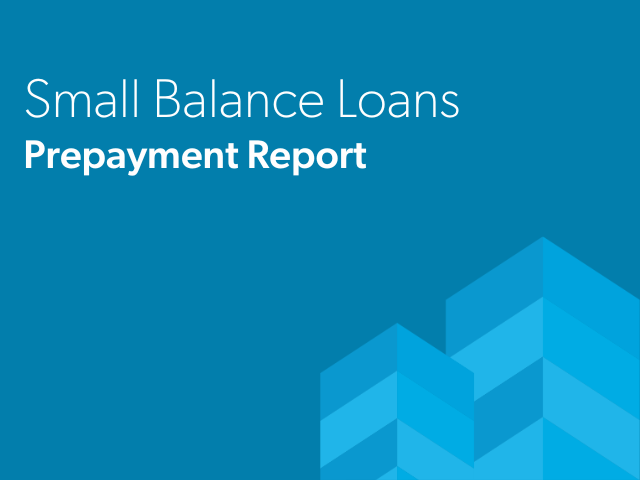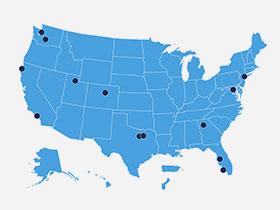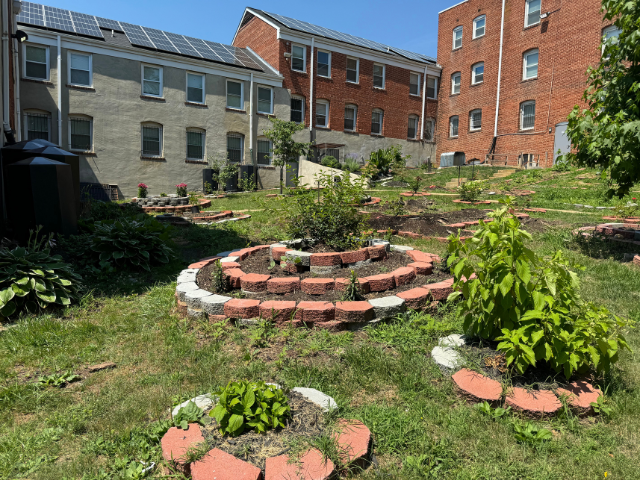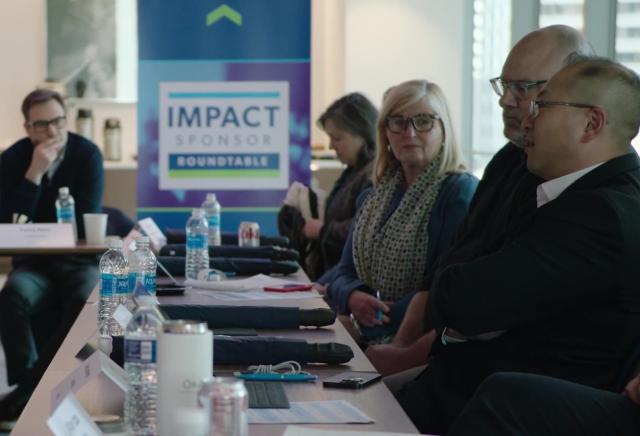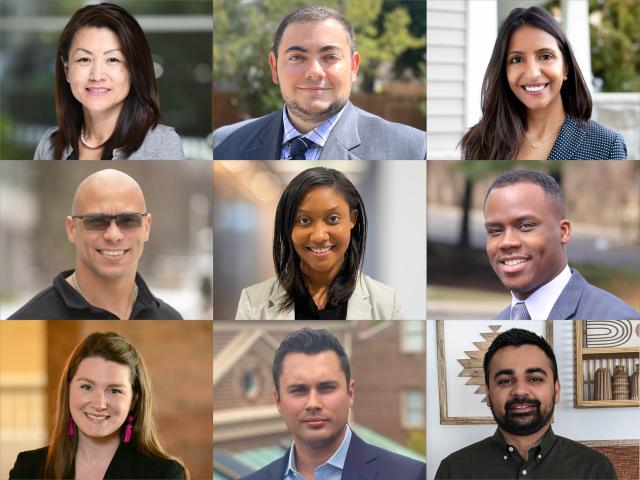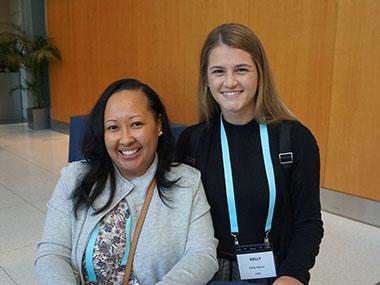Justin Frentzel
BUILDING HOMES ONE DEAL AT A TIME
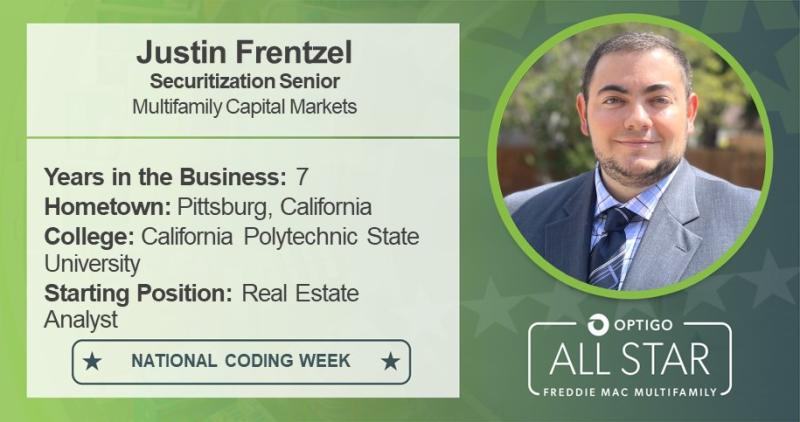
Justin Frentzel grew up in Pittsburg, California, located in the East Bay region of San Francisco. In high school, his mother helped him get his first internship at an architectural firm, which sparked his interest in becoming an architect. So, Justin applied to the architecture program at California Polytechnic State University in San Luis Obispo.
As he progressed through school, Justin interned with Prologis and got his first taste of the real estate world through the lens of an industrial owner/operator. This experience prompted him to explore the more quantitative aspects of the business and he transitioned his degree to major in both Economics and City and Regional Planning (CRP). It was during a class on securitization that Justin became fascinated by the idea of recycling capital and potentially making a difference in the affordable housing crisis he learned so much about during his CRP courses.
Upon graduating in 2017, his goal was to get a job at either of the government-sponsored enterprises since they are two of the largest suppliers of capital for housing in the United States. Justin’s relentless determination paid off — he joined the Multifamily Securitization Team at Freddie Mac in 2017.
Everyday Justin wakes up knowing that his work contributes to providing liquidity for affordable homes. He focuses primarily on affordable and municipal loan transactions, like ML-Deals® and Q-Deals, along with supporting new initiatives.
Justin shares more about how his work contributes to Freddie Mac’s mission.
How do you think Freddie Mac promotes diversity and inclusivity?
A: Freddie Mac champions diversity of thought and inclusion of differing opinions. It doesn’t matter who you are coming to the table — if it’s a good idea, it’s heard and acted upon. When I first started, I was often invited to meetings with people more tenured than me, but I never once felt that I wasn’t valued. I see a lot of collaborative, innovative solutioning when working on new initiatives, like credit reporting for borrowers. Because our company takes new ideas seriously, we keep moving the industry forward.
Freddie Mac’s mission is to 'Make Home Possible'. What does that mean to you?
A: My mother was a single mother for many of my formative years and she had to work hard to keep a roof over our heads and food on the table with a full-time corporate job. Growing up in California where housing can often feel out of reach, I have a lot of empathy for families trying to make ends meet. If I can make even a small difference in their lives by helping make affordable housing more accessible, that’s a win. Luckily for me, that’s what I get to do in my role at Freddie Mac.
Can you share a story of a frustrating grind in your job that ended up being worth it because of the long-term benefit?
A: When dealing with affordable assets, the loans often have complicated regulatory regimes that borrowers must comply with. There are also more underwriting and legal documents that must be collected and a great deal of disclosure required when taking the loans to the Capital Markets. Therefore, a lot of coordination needs to happen for everything to go smoothly.
I’ve been working on the ML program since the second deal, and with every transaction, we’ve worked with teams across Freddie Mac and our external partners to make the process better. We’ve worked with the Asset Management & Operations Team to make checklists and help streamline the document submission process for loan file deliveries. Alongside external counsel and our Legal teams, we’ve expanded regulatory analyses to better inform our offering documents and reduce duplicative legal due-diligence work. We coordinate heavily with our Investor Relations Team to make sure investors understand the full story of capital ‘A’ affordable products; the huge amounts of rehab needed to make it better for tenants and qualify for tax-exempt debt; why it’s accretive to them; etc.
Everything that we do is a team effort and requires a substantial amount of work to bring these much-needed projects to the table, and to make sure we are helping borrowers provide tenants a safe and affordable place to call home.
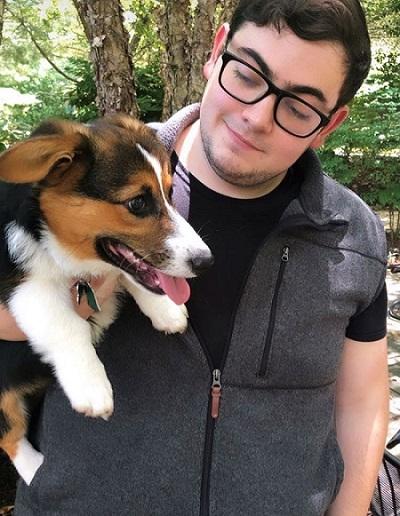
Justin and Gatsby, his Corgi, meeting colleagues at Freddie Mac’s headquarters.
September 18-22 is National Coding Week. How did you become interested in coding, and can you share how this skill has contributed to your job?
A: I first learned basic coding in school. Now, I code mostly in R, but I also do work in SQL (Structured Query Language) and VBA (Visual Basics for Applications).
Coding can seem foreign, but it’s fundamentally just a set of instructions. If you can break down each component into simple steps, you’ve already solved for 80% of the problem. The remaining 20% is determining how to convert those steps into a way the machine can understand. I’ve coded projects 50-60% of the way, hit a brick wall, and started looking for solutions using Stack Overflow or consulting a colleague. The key is to not be intimidated and to just start. Don’t be discouraged — you’d be amazed what you can get done with a little bit of Googling and asking questions when you are stuck. I’ve helped create efficiencies in my workflow that has impacted the team and improve productivity in the long run.
To see all the Multifamily All-Stars, click here.


